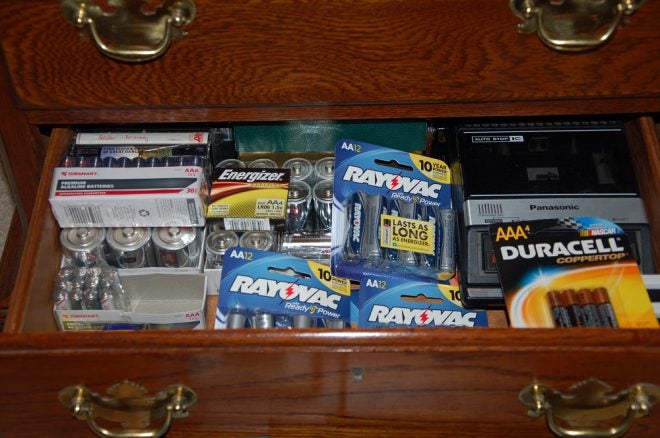Prepper Use and Care of Batteries
Dr. John Woods 12.23.16

So, at the end of the hunting season, which most often also serves in practical terms as practice for prepper activities, I remove the cell batteries from all kinds of devices for late winter and summer storage. I take batteries out of units that will be retired for several months. This includes flashlights, communication radios, trail cameras, rangefinders, scopes with lighted reticles, and assorted other cell power driven devices.
I put like batteries out of like devices into zip lock bags duly labeled. Many of these batteries had seen little use throughout the season, so I recycle them into the next year. After a couple years, I dispose of them properly and start over. Unfortunately some of the batteries do not make the storage period without leaking or ruining. What is with that?
Admittedly, some cell batteries are simply made better than others. I checked a bag of universal brand AAs last week and the bag was showing signs of a white powder-like substance inside. I inspected the batteries without opening the bag and discovered one of the batteries was indeed leaking. The white powder was coating the end and battery tube. I tossed the whole bunch, as I always assumed there would be contagious implications. Maybe not.
Perhaps the batteries taken out of outside use equipment had gained and retained some moisture from the environment. Sealing them in the zip bag caused them to “sweat.” The cheaper brand batteries seem to do this first. What are your experiences?
So, first buy the better or best brand of cell batteries to start with. The more powerful and long lasting lithium batteries would be a first choice for highly critical pieces of gear. Cheaper batteries can be used for cheaper flashlights and such. And not all alkaline batteries are the same. Most if not all are made off shore, so check the origin of manufacture. There are better choices among the many options.
For storage going into months (not days or a couple weeks) would be best in a breathable container with a top or lid though not air tight. I now take a paper punch and punch several air holes in the top of the zip bags to allow air in and out. This can help keep batteries drier. Dropping in a small dry pack can help, too. Store them in a cool, dry place. Once they get weak, toss them.